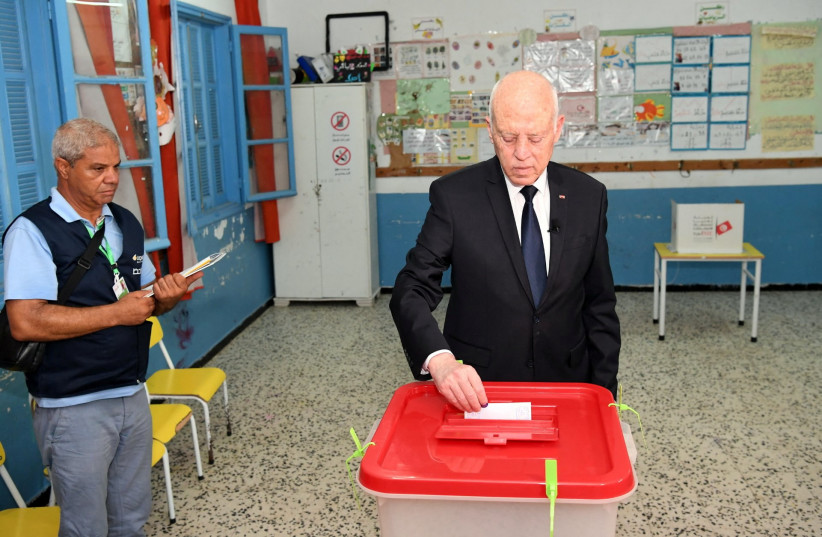Tunisia synagogue attack may bolster Saied’s bid to maintain Western aid
Two Jewish worshipers, a naval guard, and a synagogue guard were killed in an attack on Tuesday night when a Tunisian naval officer opened fire on the Ghriba synagogue in Djerba during Lag Ba’omer celebrations attended by hundreds. This incident could be used by Tunisian President Kais Saied to shore up security support from the West, despite mounting criticism of his authoritarian turn.
The attack left four people dead, not including the attacker himself, who was killed by security forces, and nine injured, according to the Tunisian Interior Ministry. The Jewish worshipers killed in the attack were cousins Aviel Haddad, 30, a dual Israeli-Tunisian citizen, and Benjamin Haddad, 42, a French businessman.
This is the first attack on the Tunisian Jewish community in over two decades. The last attack took place in 2002 when a truck bomb detonated outside the Ghriba synagogue, killing 19. The attack was orchestrated by al-Qaida.
Unclear motivations behind attack
The motivations behind the attack remain unclear with initial information suggesting it was a lone wolf operation, according to Sami Hamdi, managing director at International Interest, a global risk and intelligence company. For this reason, he believes that the Jewish community should not expect further attacks.
According to Jack Kennedy, associate director and head of the MENA Country Risk Desk at S&P Global Market Intelligence, the Tunisian security forces will respond actively.
 Tunisia’s President Kais Saied casts his ballot at a polling station, during a referendum on a new constitution, in Tunis, Tunisia July 25, 2022. (credit: TUNISIAN PRESIDENT/HANDOUT VIA REUTERS)
Tunisia’s President Kais Saied casts his ballot at a polling station, during a referendum on a new constitution, in Tunis, Tunisia July 25, 2022. (credit: TUNISIAN PRESIDENT/HANDOUT VIA REUTERS)“The Tunisian security services are likely to take an attack of this type extremely seriously, so there will probably be renewed security protocols around the site and an uptick in counterterror operations throughout the country,” Kennedy said.
He told The Media Line that tourism is a major source of foreign currency, and the current state of the Tunisian economy cannot risk further damage to its reputation for fear of harming the industry.
In addition, Kennedy believes that the incident could serve Saied as leverage to secure more Western cooperation, despite its criticism of the Tunisian president’s authoritarian measures.
This incident, he said, “is likely to strengthen Saied’s position vis-à-vis maintaining a stronger relationship with the West, particularly the US, in maintaining security cooperation and financial support.”
Kennedy argued that since this is the first attack on the Tunisian Jewish community since 2002, it will likely be seen “as part of a wider concern that a major collapse of the Tunisian economy and security forces would lead to more religiously motivated violence.”
Saied’s attempts to shift away from Tunisia’s democratic institutions have resulted in funding cuts from Western partners, he explained. However, this has not necessarily been reflected in aid related to security and intelligence. Kennedy believes that this kind of incident is likely to refocus attention on the importance of those types of cooperation.
Therefore, while the attack “is unlikely to develop stronger support for the political direction of Saied’s administration, it can serve to orientate support, however critical, on a purely security focus.”
Jews are considered Tunisian
Hamdi agrees, saying that the attack “is likely to further encourage international normalization of Saied’s coup as his government will insist that there should be greater coordination to ‘tackle terrorism and extremism,’ that the democratic transition ‘failed to address’ and that the international community should stop dragging its heels on financial assistance and support his economic initiatives,” he said.
In terms of the country’s Jewish population, Hamdi argues that the general attitude of Tunisians toward the Jewish community is one of tolerance.
“They are considered Tunisians, and antisemitism toward the population has never been present in popular and social discourse,” he said.
But Kennedy notes that historically there have been more radicalized elements within Tunisia. He pointed out the disproportionate number of Tunisian fighters volunteering for the Islamic State in comparison to other countries.
However, he reiterates that Tuesday’s attack appears to be the work of a single individual, and it’s not clear that there was any wider group planning the attack.
Nadeem Ahmed Moonakal, a research scholar at the Rasanah International Institute for Iranian Studies in Riyadh, told The Media Line that, despite being very overtly pro-Palestinian, “the Tunisian government has been careful to ensure the safety and security of the Jewish minorities in the country.”
He added that a few years ago, Saied visited the Ghriba synagogue where he praised the Tunisian Jews who fought against colonialism and emphasized the historical and civilizational values of peaceful co-existence in Tunisia.





Comments are closed.